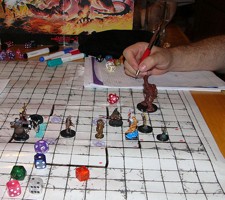My earliest attempts at writing fell largely into two categories: emulating my favorite authors, and stories based on roleplaying games. For me it was a natural progression from reading fantasy to roleplaying to writing. My first novels were little more than extrapolations of these mutually-bound activities. (What if Sir Galahad existed in a Gary Gygax world? What if a team of adventurers acted like the characters from Mission: Impossible?) Those novels were (thankfully) never published, but I learned a great deal from them. Let me sum up some of those lessons.
The mainstream doesn’t have much respect for gaming. By gaming, I mean fantasy roleplaying. Shooter and sports games like Halo and Madden get a pass and are even considered cool in some social circles, but if you sit around a table with a bunch of friends pretending to slay orcs, you’re labeled a geek of the worst kind. That seems silly to me. How a person chooses to spend his/her leisure time is none of my business, but pretending to shoot aliens or score touchdowns is certainly no more mainstream than kicking dragon ass in my book.
Roleplaying campaigns don’t necessarily make for fine literature. Now there are some exceptions. Author Steven Erikson has stated that his very awesome Malazan Book of the Fallen series was based on a roleplaying campaign. But Mr. Erikson has also made it clear that he was consciously running away from the tropes of gaming (and fantasy) in creating his epic.
Why don’t roleplaying games make for good fantasy stories? Well, for one, most gaming systems have rigid structures for character archetypes (classes), development (leveling), behavior (alignment/roleplaying suggestions), and abilities (powers/spells). And once you start thinking of your story character as a game piece, you’ve taken a very large step toward creating a caricature, unintended as it may be. In literature, characters are organic creations. They act, react, and interact based upon how the author views humanity, not how a game designer sees the world.
Another reason most gaming adventures don’t translate well into prose is that gaming is often little more than wish fulfillment, which is fine in and of itself, but it doesn’t bode well for your narrative. You could argue that escapist literature is everywhere, and I’d not deny it, but I don’t believe that should be your highest writing goal.
But what about gamers who read fantasy? Certainly they would enjoy books about campaign-derived adventures. Some of them do (and it might be less than you suspect, or hope), but unless you’re representing a name brand like Wizards of the Coast or Lucas Arts, you have a better chance of winning the lottery than getting anyone to pay attention to your homebrew campaign.
It isn’t my intention to disrespect gamers. I’m one of you, and I’ll defend your right to slay monsters and loot their bodies until my last breath. But if you’re also an aspiring author and you think your home campaign would make a great springboard for a novel, then knock yourself out. Write the best damned RPG-based book ever. And then do yourself a favor and put it in a drawer while you move on to other projects. That might not be what you want to hear, but there it is. We can debate the stuffiness of the literary world until the brie comes home, but writing for publication is a tough business. If you write anything that isn’t flavor-of-the-month and embraced by society at large, you’re already behind the 8-ball. So why make it tougher than it needs to be?
I think fantasy and roleplaying games are a natural fit. They feed each other in some very positive ways. Dungeons & Dragons was hugely influenced by J.R.R. Tolkien’s The Lord of the Rings, and in turn spawned a generation of fantasy series—some good, some bad, and others just plain ugly. But if you’re creating literature (and if you want to be published, in my opinion, this should be your real aim), at some point you’ll need to throw off the comfortable shackles of gaming conventions and test your wings in the larger world.
Jon Sprunk is the author of Shadow’s Son (Pyr Books) and the soon-to-be-released sequel, Shadow’s Lure. He is wintering with his family in chilly central Pennsylvania.










